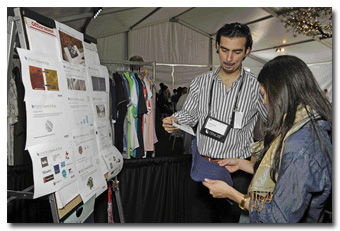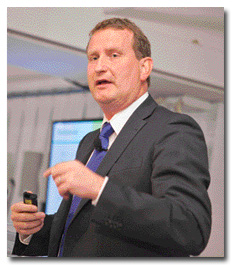More than 160 people from all levels of the supply chain traveled to New Orleans to celebrate the 20th anniversary of Tencel®, Austria-based Lenzing AG's sustainable lyocell fiber derived from wood pulp. The "Tencel@20" seminar included a day of lectures covering the fiber's past, present and future, and a trip to Lenzing's Tencel plant in Mobile, Ala., where the fiber's production process and applications were highlighted.
The International Oeko-Tex Association, Switzerland, also celebrating its 20th anniversary, invited industry figures to its "The Next 20" seminar in New York City to hear from leaders and experts about the importance and success of sustainability. The keynote speaker was Robert F. Kennedy Jr., an attorney specializing in environmental projects. Other speakers included Kevin M. Burke, American Apparel and Footwear Association, Arlington, Va.; Tom Chappell, founder of Tom's of Maine and currently owner of Ramblers Way Farm, Kennebunk, Maine; Amy Hall, Eileen Fisher Inc., Irvington, N.Y.; Nicole Basset, prAna, a small Carlsbad, Calif.-based apparel company; Mark Henning, The Dow Chemical Co., Midland, Mich.; and Elysa Hammond, of food company Clif Bar & Co., Emeryville, Calif.

Attendees at Lenzing's Tencel® 20th anniversary activities had the opportunity to see the range of applications in which the fiber is being promoted.
Oeko-Tex
At "The Next 20," Oeko-Tex Secretary General Jean-Pierre Haug, Ph.D., noted that sustainability is on the rise. There were no comprehensive international standards regarding textile testing for hazardous substances until Oeko-Tex developed its system. Today, Oeko-Tex has 67 offices around the world; and 14 research and testing companies globally work through the supply chain to certify apparel and home furnishings products. Last year, there were 3,416 audits, of which 2,683 passed outright, 716 needed adjustments and 17 failed.
Testing for harmful substances is determined by a textile's end-use; hence, there are different criteria for baby items, underwear, jackets and home textiles. Products are tested at all stages of processing and are certified for one year. "We give people standards that are independent and transparent," Haug said. "We are working for a better world."
Burke said that today, four million people in the United States work in the soft goods industry, and although China's is the biggest sector, it is declining. A big question is, who is the next-biggest player? There are challenges and opportunities, and sustainability is high on the list.
Three years ago, after Chappell sold Tom's of Maine to Colgate-Palmolive, he felt the need to champion a new product and became a sheep farmer. Ramblers Way Farm is totally vertically integrated and sustainable, and its buildings are heated by a geothermal system backed up by solar panels. The company gets 18-micron wool from the 100 Rambouillet sheep on its farm as well as sheep from farms in Montana, Nevada and Texas. Knitted fabrics made with the wool are designed into apparel by Chappell's daughter and sold in 300 stores. "We're building relationships more than making transactions," Chappell said. Woven fabrics are next.
Recently, Dow introduced SILVADUR™, a nontoxic, durable silver ion-based technology that provides advanced antimicrobial control to fabrics. Henning said the treatment may be applied using standard coating methods and lasts up to 50 washings.

Lenzing
Tencel's sustainability was evident during Lenzing's plant tour. All solvents used in processing this fiber are recycled and can be used again. Southern pine from Georgia blended with South African eucalyptus comes to the plant in sheets to be shredded, dissolved, filtered and spun. There are 20 different fiber products.
Tencel's applications were presented in vignettes. Botanic denim is one area in which lightweight, silky products are in demand. A botanic bed displayed sheets, duvet covers, mattress pads and ticking that are smooth, silky and cool. For new home applications, Tencel/cotton upholstery fabrics are shiny, soft, washable and dimensionally stable. Floor coverings also were shown.
Tencel active natural-touch and moisture-wicking fabrics for running, basketball and yoga are offered in lines from Nike Inc., adidas and Reebok International. Tencel C® cosmetics show anti-wrinkle advantages. Tencel wool is popular because of Tencel's lightness, soft hand and luster.
Vision and aspiration introduced a day of talk about Tencel. Morning sessions were presented by Lenzing executives including Peter Untersperger, CEO; Friedrich Weninger, COO; Dieter Eichinger, vice president and general manager, Textile Fibers; Andreas Dorner, global marketing director, Textile Fibers; Johann Leitner, project manager marketing special projects, Textile Fibers; Susanne Jary, head of home textiles marketing, Textile Fibers; and Peter Bartsch, head of apparel marketing, Textile Fibers.
According to Untersperger, in 1992, Tencel developer Courtaulds plc produced 16,000 tons of the fiber in Mobile. Lenzing took over the brand in 2005, and today, production in Mobile totals 50,000 tons annually. Weninger added that along with apparel and home furnishings, Tencel is going into technical products as diverse as baby wipes and battery separators.
Eichinger noted that Tencel influences comfort, durability and performance. These features as well as moisture-management, bacteria-reduction and smoothness-to-theskin qualities are among the reasons Lenzing has tripled the fiber's capacity in the last 10 years. Eichinger also noted that "our research and development expenses have increased."





